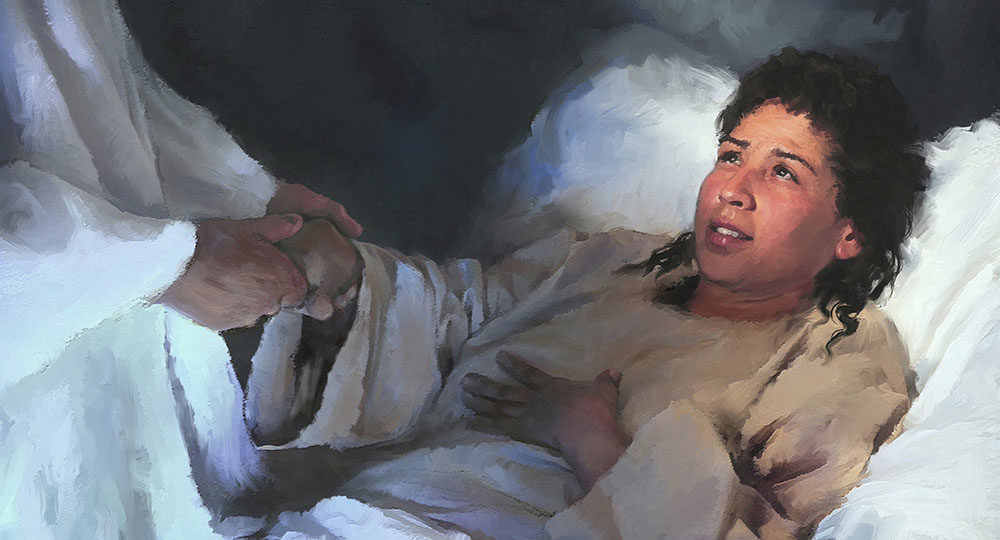A Heart for Our Needs
Charles Haddon Spurgeon, a 19th-century, British Baptist preacher, opened his great Christmas Eve sermon published in 1914 with these words: “He was moved with compassion” (Mt. 9:36). Spurgeon continued:
This is said of Christ Jesus several times in the New Testament. The original word is a very remarkable one. It is not found in classic Greek. It is not found in the Septuagint. The fact is, it was a word coined by the evangelists themselves. They did not find one in the whole Greek language that suited their purpose, and therefore they had to make one. It is expressive of the deepest emotion; a striving of the bowels—a yearning of the innermost nature with pity.1
In other words, no one was as compassionate as He.
Ancient Judaism fervently believed compassion to be one of God’s paramount virtues. Judaism teaches it is among the first of God’s 13 attributes of mercy mentioned in Exodus 34:6–7. These 13 attributes are so reassuring to Jewish people that they recite them in unison three times during the Jewish high holidays of Rosh Hashanah and Yom Kippur. Many synagogue liturgies refer to God as the “Father of Compassion” (Av Harachamim).
As Immanuel (“God with us,” Mt. 1:23), Jesus openly expressed His deep compassion for the sorrowful and sick and for the souls of mankind.
For the Sorrowful
It is never easy to see a loved one die. The New Testament records three occasions when Jesus raised people from the dead: He raised Lazarus (Jn. 11), a widow’s son (Lk. 7:13–14), and Jairus’s daughter (8:49–55). Each time, He was moved by compassion.
The widow’s son was raised in the village of Nain (Hebrew for “pleasantness”). As Jesus approached the village gate, the pleasantness was overshadowed by the gloom of death. A young boy had died, and his body was being taken to the cemetery.
When the Lord saw the widow, He literally felt her pain and despair. Showing no dread of the greatest of all defilements under Jewish law—that of contact with the dead—Jesus walked to the bier, touched it, and said, “Young man, I say to you, arise” (7:14). The boy immediately sat up and began to speak. Jesus then gave him back to his mother.
Nain witnessed the fulfillment of an ancient set of prayers called the “Eighteen Benedictions.” The second benediction, recited daily, praises God because He alone revives the dead. It is no wonder the miracle at Nain stirred great fear as the crowds praised God. They recognized a mighty prophet had come; and they declared, “God has visited His people” (v. 16).
For the Sick
“And when Jesus went out He saw a great multitude; and He was moved with compassion for them, and healed their sick” (Mt. 14:14).
Healing was essential to Jesus’ ministry. It authenticated His Messiahship. The Gospel of Matthew is usually viewed as being written to Jewish people. So it is no wonder Jesus’ compassion is mentioned more times in Matthew than in any other Gospel.
Matthew emphasized Jesus’ kingship and authority. During an illness, the Jewish tradition is to read from the Psalms. Why? Because the great God of David, who is all-compassionate and who alone is the ultimate, authoritative King, can bring healing, according to His purposes.
In accordance with Jewish expectations, Jesus healed the sick for two main reasons:
(1) To prove He was God in the flesh. Early in Israel’s history, the Lord made a covenant of healing with His people. He established the fact that only God, the great Physician, can heal: “for I am the Lᴏʀᴅ who heals you” (Ex. 15:26).
Jesus’ healing ministry sent a strong message that the same God who made the covenant of healing with the Jewish people now walked among them.
(2) To prove He could forgive sins. Many in Jesus’ time assumed all sickness was a result of sin (cf. Jn. 9:2). It must have been a shock when Jesus told a paralytic man, “Son, your sins are forgiven you” (Mk. 2:5). Jesus then challenged the doubters:
“Which is easier, to say to the paralytic, ‘Your sins are forgiven you,’ or to say, ‘Arise, take up your bed and walk’? But that you may know that the Son of Man has power on earth to forgive sins”—He said to the paralytic, “I say to you, arise, take up your bed, and go to your house.” Immediately he arose, took up the bed, and went out in the presence of them all, so that all were amazed and glorified God, saying, “We never saw anything like this!” (vv. 9–12).
For Souls
In the ancient world, sheep were a major industry. Sheep and lambs are mentioned more times in the Bible than any other animal and sometimes symbolize God’s people.
Sheep are known for their tendency to wander from the herd and get lost. It is the shepherd’s role to rescue them and bring them home to the sheepfold.
Jesus had the heart of a loving shepherd: “When He saw the multitudes, He was moved with compassion for them, because they were weary and scattered, like sheep having no shepherd” (Mt. 9:36). Jesus came to save souls—to bring into His fold those who are lost in sin and looking for truth.
The Bible makes it clear that everyone has a sin nature (Eccl. 7:20; Rom. 3:23). Sin causes separation from God and is the universal reason why death exists (Isa. 59:2; Rom. 6:23).
The sad outcome is that humanity is helpless to deal with its sin issue (Isa. 64:6; Eph. 2:8–9). Therefore, from God’s perspective, “All we like sheep have gone astray; we have turned, every one, to his own way” (Isa. 53:6).
However, the good news is that Jesus, being the Good and Great Shepherd, gave His life to save the “sheep” (Jn. 10:11; Heb. 13:20).
As the prophet Isaiah foretold, “The Lᴏʀᴅ has laid on Him the iniquity of us all” (Isa. 53:6). Jesus came to save lost souls and provide the free gift of eternal life (Mt. 1:21; Eph. 2:8).
He was full of deep compassion, and He demonstrated it in ways people could understand by raising the dead, healing the sick, and forgiving sin.
“Through the Lᴏʀᴅ’s mercies we are not consumed, because His compassions fail not. They are new every morning; great is Your faithfulness” (Lam. 3:22–23).
ENDNOTE
- C. H. Spurgeon, “The Compassion of Jesus,” Metropolitan Tabernacle Pulpit, December 24, 1914, The Spurgeon Archive <spurgeon.org/sermons/3438.htm>.








